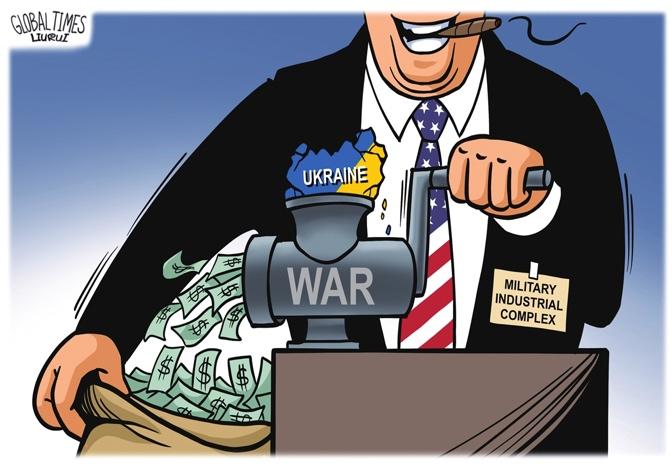
[Source: globaltimes.cn] 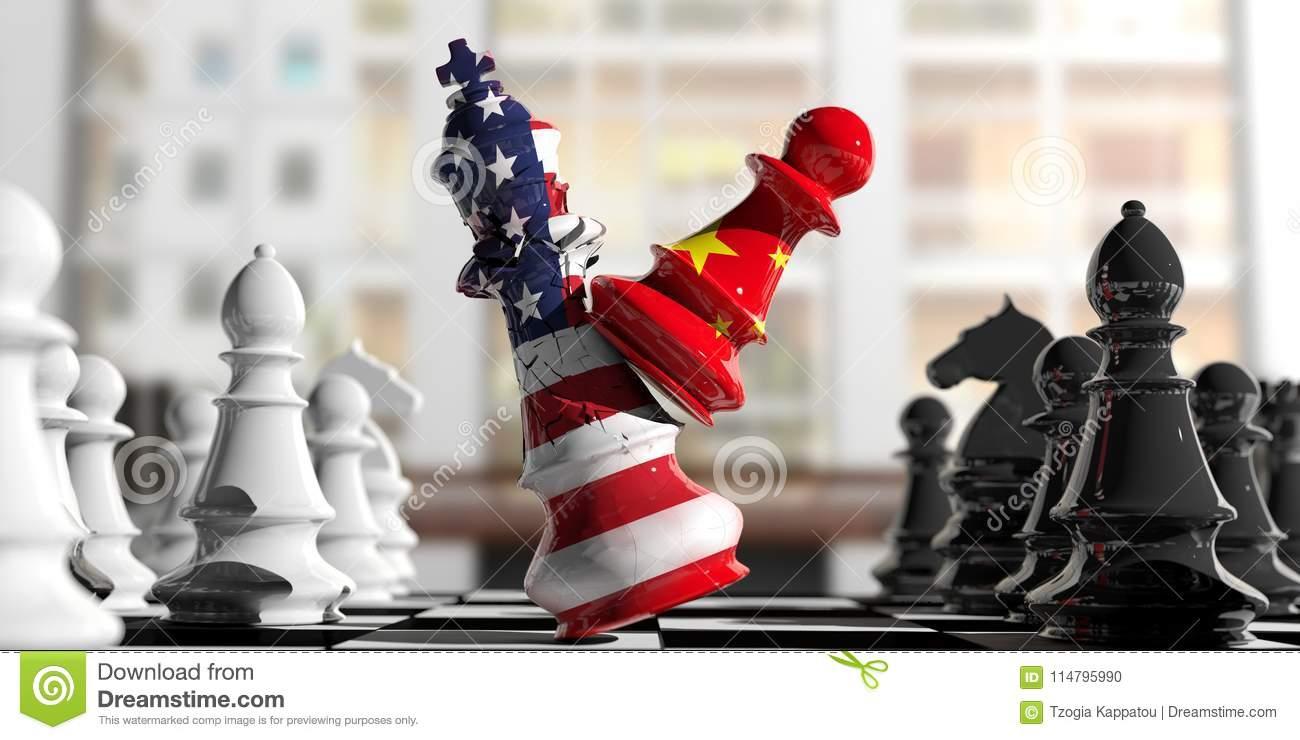
[Source: dreamstime.com]
Fits long pattern of war-mongering and provocations that are a feature of the American Century
When U.S. President Joe Biden speaks about war and peace, we have to listen carefully whether we like it or not. Regarding Taiwan, when asked in Tokyo on May 23 if he was “willing to get involved militarily to defend Taiwan,” Biden said without hesitation, “yes, that’s the commitment we made.” White House staff rushed to say “our policy has not changed,” but others found it part of escalating Cold War chatter.
The U.S. does not have a security alliance with Taiwan. Rather, it officially recognizes it as part of China. The U.S. State Department website says “The United States has a long-standing one China policy… We oppose any unilateral changes to the status quo from either side; we do not support Taiwan independence; and we expect cross-Strait differences to be resolved by peaceful means.”
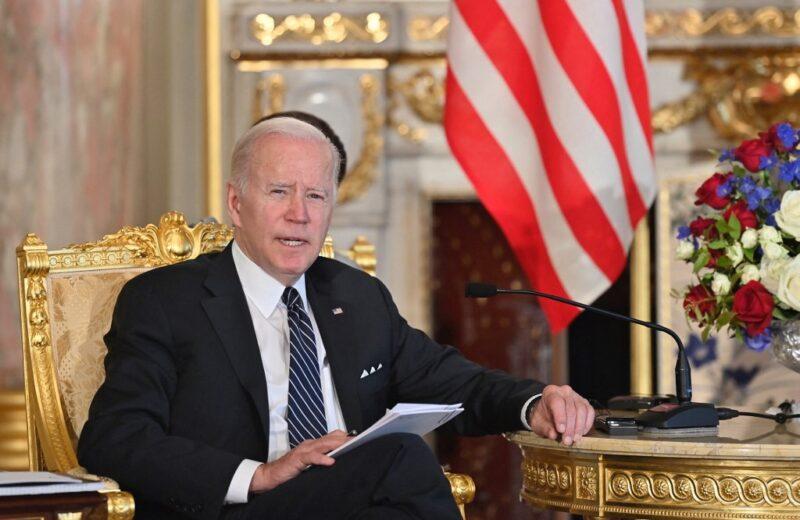
But the “no change” claim contrasts with Biden’s meeting with Quad Alliance members, two of whom are equipped with nuclear weapons, U.S. warships passing through the Taiwan Straits and non-stop anti-China rhetoric from Washington. “War Games: The Battle for Taiwan,” a 27–minute segment ran recently on NBC’s Meet the Press—quite likely a co-production with the State and Defense departments, according to columnist Patrick Lawrence.
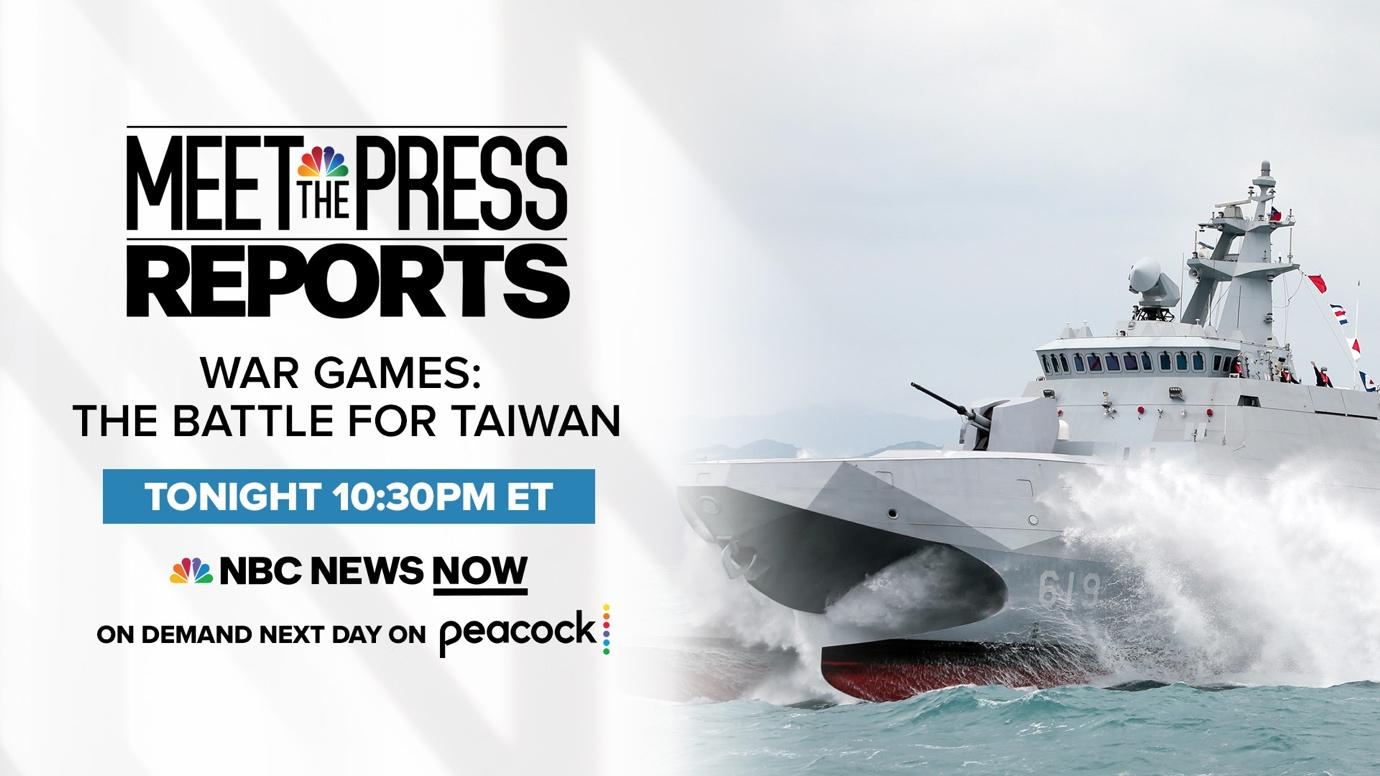
China reacted predictably to the Biden statements. “On issues that bear on China’s sovereignty, territorial integrity, and other core interests,” Wang Wenbin, a foreign ministry spokesman, said “no one shall expect China to make any compromise or trade-offs.”
“Defending Taiwan Would Be a Mistake,” was the headline of a May 27 New York Times op-ed by China expert Oriana Skylar Mastro of Stanford University. “Simply put,” she wrote, “the United States is outgunned. At the very least a confrontation with China would be an enormous drain on the U.S. military without any assured outcome that America could repel all of China’s forces.” She highlighted a 2018 assessment warning that the U.S. could face a “decisive military defeat” in a war over Taiwan, citing China’s increasingly advanced capabilities and myriad U.S. logistical difficulties. “Several top former U.S. defense officials have reached similar conclusions,” she wrote.

CGTN, China’s Global TV Network, gave another answer. “The Warmonger’s Legacy” appeared on YouTube on May 27. Starting with the Gulf of Tonkin episode of August 1964 off the coast of North Vietnam, then cycling through the endless U.S. wars in the second half of the 20th century, it lets a parade of U.S. presidents make the case. Jimmy Carter comes off best, stating “we know which is the most warlike country on earth—my country, the United States.”
It shows LBJ’s defense secretary, Robert McNamara, admitted to dishonesty about the Gulf of Tonkin—where the U.S. had provoked the North Vietnamese into attacking the U.S.S. Maddox—saying “our judgment that we’d been attacked…was wrong.” George W. Bush’s defense secretary, Colin Powell, is heard testifying at the UN about “weapons of mass destruction” in Iraq, and Bush himself declaring that “Saddam Hussein…must leave Iraq within 48 hours.”
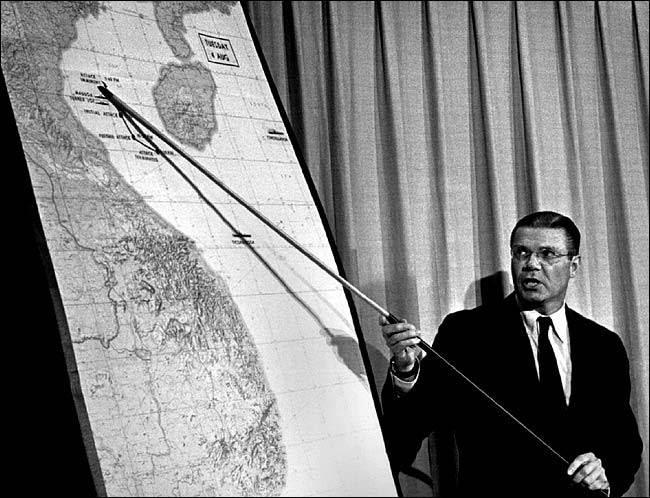
Barack Obama shows up to say “the Gaddafi regime is coming to an end.” Trump appears announcing a bombing of Syria, claiming “chemical weapons.” Papa Bush says “air attacks are under way in Iraq” to take out “Saddam Hussein’s nuclear bomb potential.” Bill Clinton declares military victory in Yugoslavia, while two super-imposed screens state that, “In 78 days of bombing, NATO dropped approximately 20 kilograms of explosives for every person in the targeted areas,” and “By supporting Kosovan separatism, NATO showed scant concern for national sovereignty and territorial integrity.”
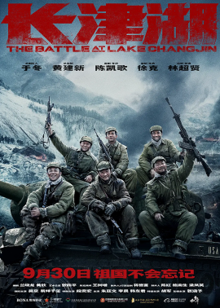
Harry Truman appears to say “We’re fighting in Korea for our own nation’s security and survival.” (This one is of special interest to the Chinese, who recently celebrated their role in the Korean War with the blockbuster hit, “The Battle of Lake Changjin.”)
Tricky Dick Nixon shows up declaring that the 1970 invasion of Cambodia was “for the purpose of ending the war in Vietnam.” The movie doesn’t show the killings of anti-war students at Kent State and Jackson State universities, but it does show several protests, with the familiar slogans “Money for Jobs Not War,” and “No Blood for Oil.”
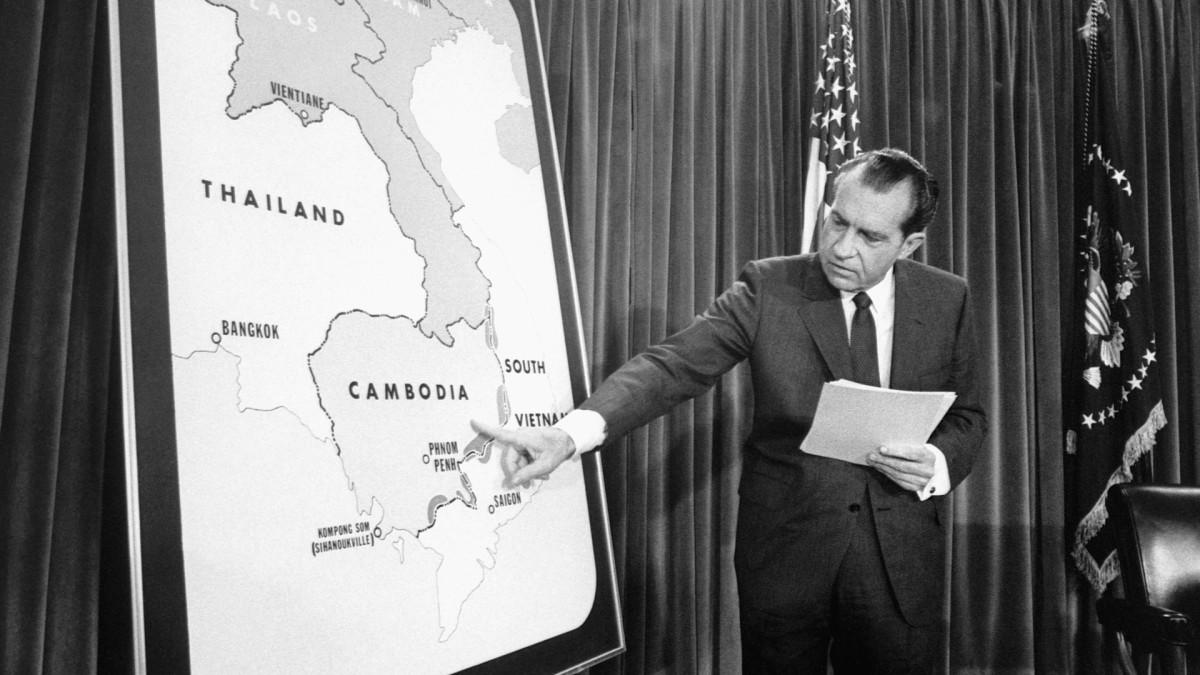
Saving the best for last, Joe Biden is presented at a recent NATO conference proclaiming “quite frankly that America is back.” Russian President Vladimir Putin appears, stating “The People’s Republics of Donbas asked for help from Russia.” And European Commission President Ursula von der Leyen heroically declares “our airspace will be closed to every Russian plane.” Russian Foreign Minister Sergey Lavrov appears calmly affirming that the Ukrainian government’s war policy “is determined in Washington and London.”
The basic message of this CGTN feature is that China should not be expected to “play nice” in the face of U.S. efforts to extend its war with Russia to include all of Eurasia.
Biden: “What America Will and Will Not Do in Ukraine”
To deal with the recently changed situation in Ukraine—where Scott Ritter says “Russia is achieving its military objective of liberating the entire territories of both Lugansk and Donetsk”—Biden issued a carefully crafted message as an op-ed in the June 1 New York Times.
The message appears to reflect a new policy, focusing on potential negotiations. “We do not want to prolong the war just to inflict pain on Russia,” he insists. And “we do not seek a war between NATO and Russia.” Whether this can be believed or not, Biden says the flood of new weapons, ammunition, and billions of dollars, is meant to help Ukraine “be in the strongest possible position at the negotiating table.”
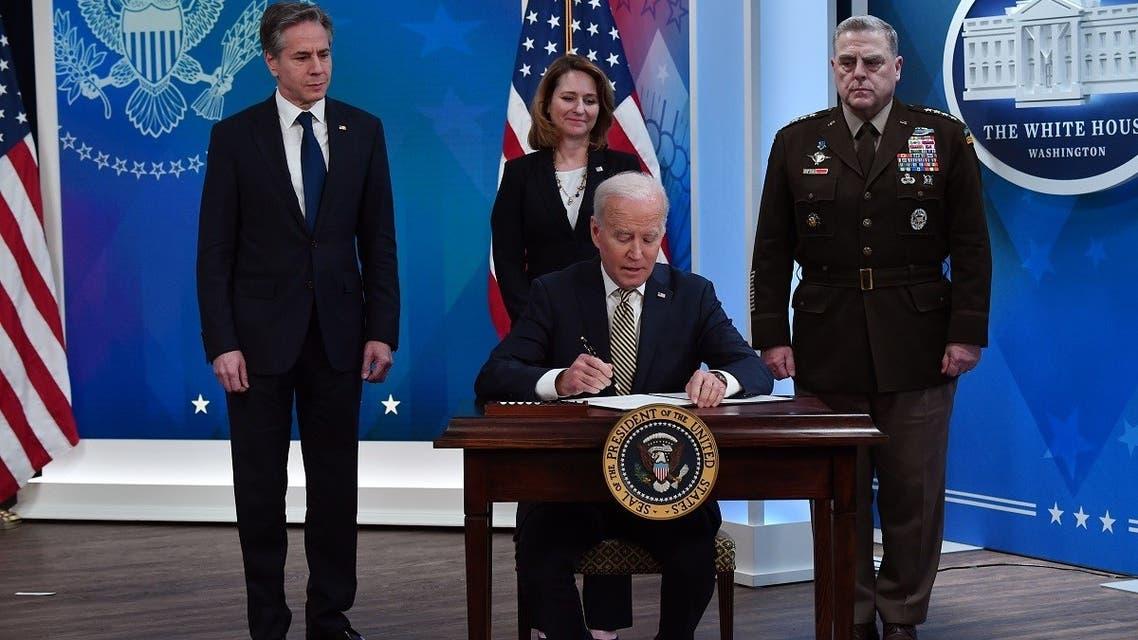
This reflects a new reality both on the ground and in the economic war against Russia. As the Guardian’s economics editor Larry Elliott wrote on June 2, things are not “going according to plan. On the contrary, things are going very badly indeed.” His conclusion is that “sooner or later, a deal will be struck.”
Guardian columnist Simon Jenkins adds that the sanctions policy “has blatantly failed… sanctions are clearly hurting countries in western and central Europe who are imposing them.” A major recession threatens in both Europe and the U.S., as prices for fuel and food skyrocket. “The victims are overwhelmingly the poor,” Jenkins says.
African Union leader Macky Sall, President of Senegal, met with Russian President Putin in Russia on June 3. After talks on food shortages allegedly caused by the war, the leader said “I found Vladimir Putin committed and aware that the crisis and sanctions create serious problems for weak economies, such as African economies.” He said he was leaving Russia “very reassured and very happy with our exchanges.”
President Putin said Russia is “always on Africa’s side,” and is now keen to ramp up cooperation. He said Russia is ready to look for ways to ship grain stuck at Ukrainian ports, which western media falsely claims that Russia is blocking, but demanded the West lift sanctions. Russian Foreign Minister Sergey Lavrov expects to visit Turkey June 8 for talks on creating a “security corridor” to unblock grain exports from Ukraine.
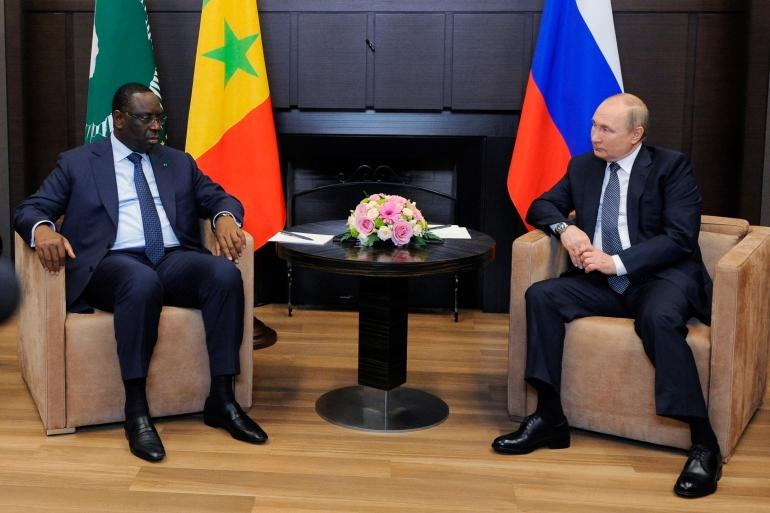
A June 2 New York Times report said “Western nations like the United States, as well as Ukraine, oppose lifting sanctions imposed on Russia.” A UN report says around 25 million tons of grain from last year’s Ukraine harvest are stranded in silos, and another 50 million tons are expected to be harvested in coming months. David Beasley, executive director of the World Food Programme, said: “Right now, Ukraine’s grain silos are full. At the same time, 44 million people around the world are marching towards starvation.” The Times report said Turkey has proposed using its ships to transport grain from Odessa which, in addition to getting Ukraine to demine the port, would require an agreement from Russia.
In a June 3 interview, President Putin said Ukraine “must clear the mines and raise the ships they sunk on purpose in the Black Sea to make it difficult to enter the ports to the south of Ukraine… we will not use the demining process to initiate an attack from the sea.” He added there are numerous ways grains from Ukraine could be exported by rail or by sea, with full Russian cooperation.[1]
On June 6 the New York Times lead front-page headline was “Putin Peddles Stolen Grain To Needy World, U.S. says.” The “stolen” grain comes mainly from the Donbas and regions of Kherson and Zaporizhzhia, which are occupied by Russian forces, the Times article says. There is no mention of Russia itself as a possible source. According to UC Davis professor Aaron Smith’s Ag Data News, Russia produces 11% of the world’s wheat and Ukraine produces 3%. Russia accounts for 19% of the global wheat export market and Ukraine 9%. Africans and Russians have a shared interest in moving the wheat.

African countries are unlikely to hesitate before buying Russian-supplied grain, no matter where it comes from, said Hassan Khannenje, director of Kenya’s HORN International Institute for Strategic Studies, according to the Times report. Any Western pressure over Russian supplied grain is likely to backfire, he said. A Kenyan Foreign Affairs ministry spokesperson asked “Why would they need to warn us in the first place? This sounds like a propaganda ploy.” Which is clearly what it is given that the population in Donbas and in Kherson and Zaporizhzhia largely welcomes integration with Russia and does not consider its grain to have been stolen.
Negotiations?
All this underscores the urgency for negotiations to end the current war. But whether Washington and its NATO allies on the one hand, and Russia on the other, will decide to talk is an open question. Biden wrote in The New York Times op-ed: “I will not pressure the Ukrainian government—in private or public—to make any territorial concessions.”
He did not say if the U.S. would exert pressure against such concessions, which would surely be required for talks to start. Most recently, Ukrainian President Zelensky has continued to insist on a status quo ante, meaning Russian troops leaving all the areas they have occupied. Neither the Russian government nor the people of the Donbas, Crimea and nearby areas can be expected to give up the gains achieved in the war.
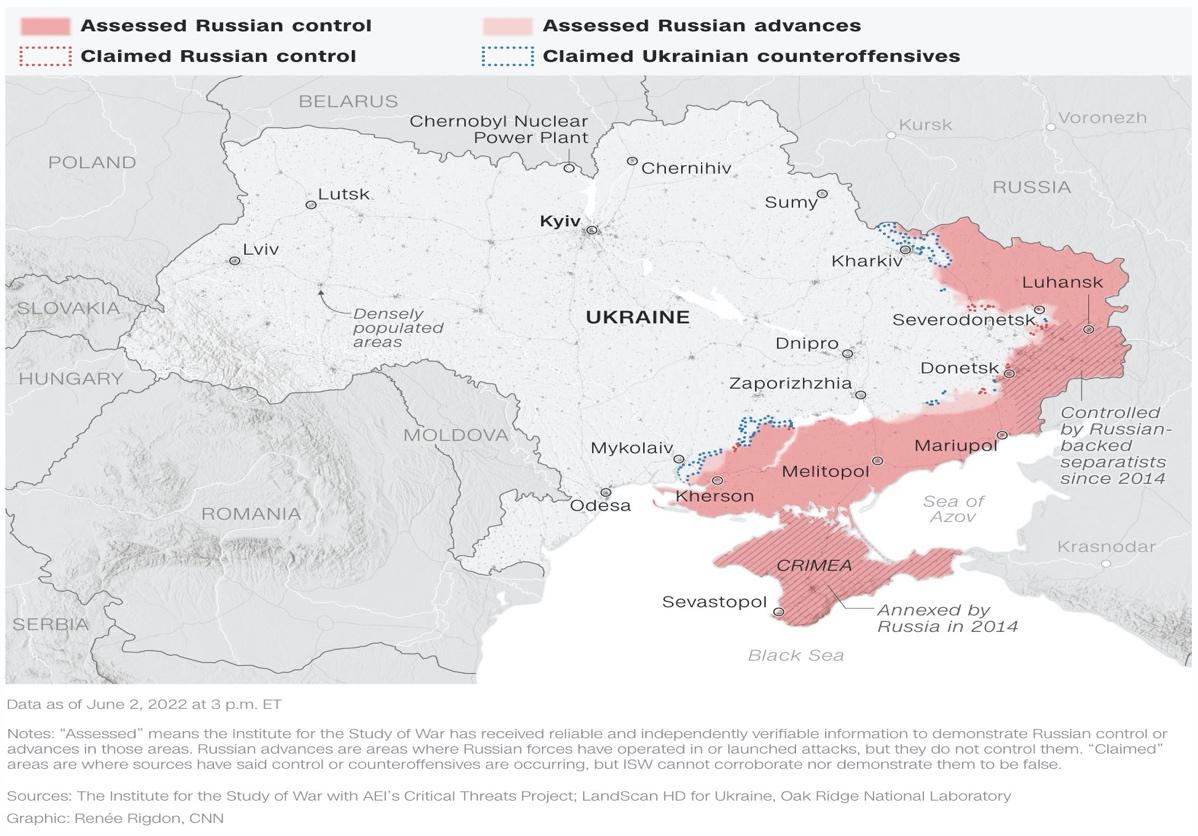
Biden said “Ukraine’s talks with Russia are not stalled because Ukraine has turned its back on diplomacy.” He said, instead, that it is Russia’s fault. He may actually believe that.
On June 4, the same week Biden’s op-ed appeared, the Times ran a lead editorial by Christopher Caldwell saying “the administration is closing off avenues of negotiation and working to intensify the war.” It also said the U.S. “is trying to maintain the fiction that arming one’s allies is not the same thing as participating in combat,” adding that the massive U.S. and NATO support is “a powerful incentive not to end the war anytime soon.”
Scott Ritter wrote May 30 that Russia’s recent major battlefield successes in the Donbas “will leave Russia with a number of unfulfilled political objectives”—including denazification, demilitarization, permanent Ukrainian neutrality, and western acceptance of a new European security framework. Whether these objectives can be achieved in negotiation or only continued war is an open question.
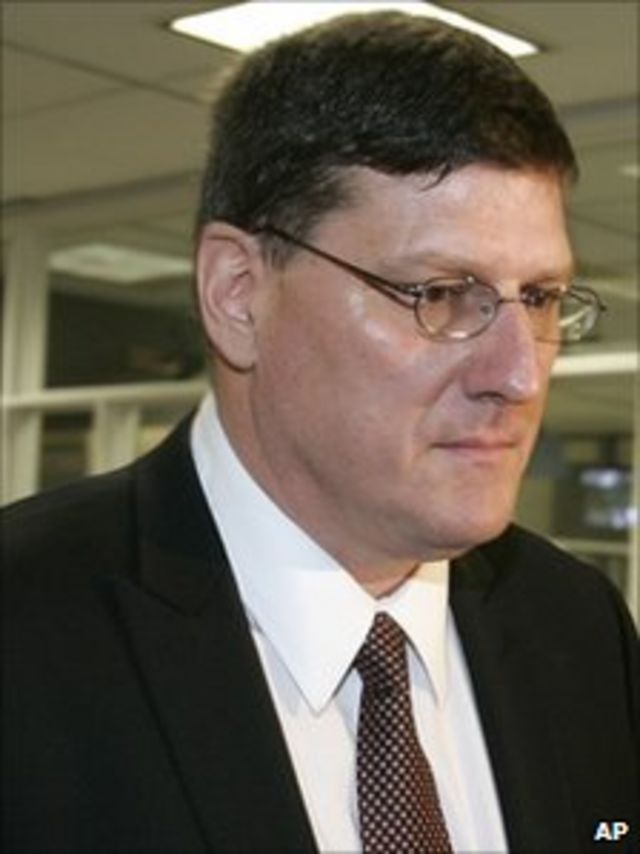
Ritter emphasizes that Russia linked its special military operation to Article 51 of the UN Charter, claiming “preemptive, collective self-defense.”
This claim is supported by Ellen Taylor, daughter of Nuremberg prosecutor Telford Taylor, who wrote recently that “Russia, convinced that an attack was imminent, despairing of negotiations, persuaded by information contained in a hacked email, and aware of the danger of waiting any longer, launched its ‘special operation.’”
Taylor cites reports from the Organization for Security and Cooperation in Europe (OSCE) that from February 15 to 24, Ukrainian army shellings in the Donbas increased daily from 41 to more than 2,000 on successive days. Taylor says “NATO’s intention was to precipitate an attack. From a legal perspective it was imperative not to be identified as the aggressor. Russia was aware of this too.” She adds that Russian leadership had “the responsibility to protect” its people.
Taylor concludes that “the crime of conspiracy to commit a war of aggression… has to be laid at the feet of NATO and the U.S.” She adds that “the often-repeated claim that Russia’s aggression was unprovoked, is preposterous.”
“Stay the Course”
Biden’s essay ends with some pontification, saying the U.S. will “stay the course with the Ukrainian people because we understand that freedom is not free. That’s what we have always done whenever the enemies of freedom seek to bully and oppress innocent people.”
In some parts of the world—like Africa, Asia, the Middle East and Latin America—it has been the United States that has sought to bully and oppress innocent people. It is happening now, in Yemen and Somalia, and continues in Syria, Iraq and Afghanistan. Many Latin American governments claim it is also happening in their region. Some in Western Europe feel their governments have been bullied by the U.S. to go along with the self-destructive economic war of attrition there. In the second half of the 20th century U.S. interventions in Asia, Africa, the Middle East and Latin America have caused millions of deaths, and condemned millions more to extreme poverty and misery, according to The Jakarta Method, by Vincent Bevins.
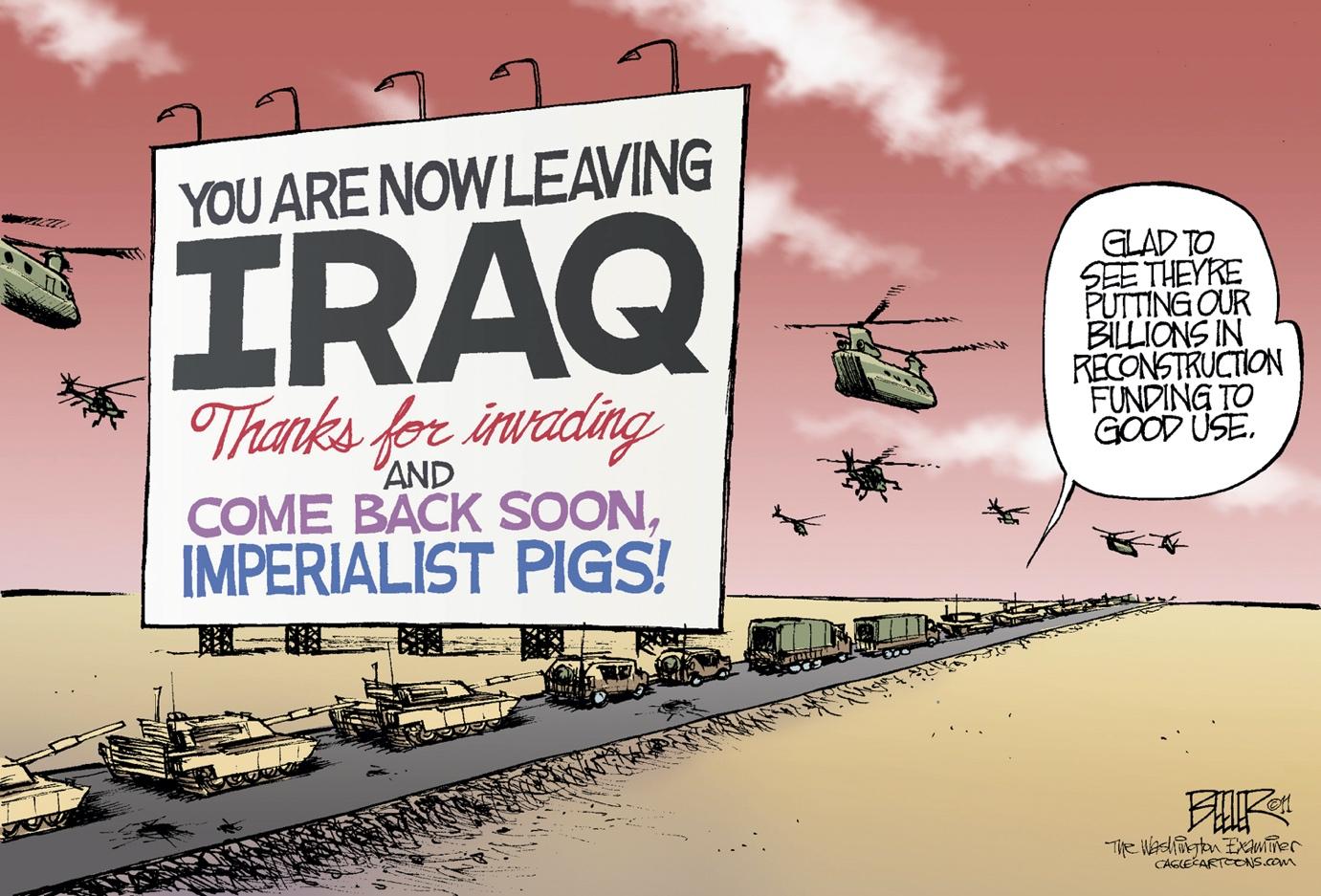
The U.S., especially the CIA, has teamed up with local oligarchies to suppress democratic initiatives across Latin America: an attempted coup against Venezuela’s Hugo Chávez in 2002, and against his successor Maduro in 2020; successful coups in Haiti in 2004 and Honduras in 2009; “lawfare” (fake legal scandals) leading to impeachments in Paraguay in 2012 and Brazil in 2016; a “self-coup” in Ecuador by President Lenin Moreno in 2017; and a temporarily successful coup against Bolivia’s President Evo Morales in 2019. It is a pattern dating from the 1960s.
This lived experience by the peoples who live outside the NATO alliance makes it increasingly difficult for Biden and his neocon advisers to make credible claims about protecting innocent people from the enemies of freedom. The question is: Who will protect us from Biden and the neocons?
In a recent Black Agenda Report article, contributing editor Danny Haiphong says “Joe Biden is in trouble. The crisis of legitimacy afflicting his administration continues to worsen.” A new AP-NORC poll pegs Biden’s approval rating at 39%. Rising inflation and shortages in basic needs, such as baby formula, have played a major role in Biden’s declining popularity, as has an undue focus on prolonging the Russia-Ukraine conflict. The Biden administration is set to send $40 billion in military aid to Ukraine despite the fact that the war does not make the list of major issues of concern for voters, let alone the general population.
It may be pressure from below—from ordinary people in the U.S., Europe, and the countries of the global South—that will finally bring enough pressure to achieve a durable peace—one which recognizes the sovereignty of Donbas and the post-2014 status of Crimea, and demilitarization and denazification of a new Ukraine.

-
In a June 3 interview broadcast on Russia’s Rossiya 1 television network, Russian president Vladimir Putin responded to the accusations that Russia’s actions in Ukraine are worsening the world food and fertilizer price squeezes. He said: “I have already said to all our colleagues many times – let them [Ukraine] demine the ports and let the vessels loaded with grain leave. We will guarantee their peaceful passage to international waters without any problems. There are no problems at all. Go ahead. “They must clear the mines and raise the ships they sunk on purpose in the Black Sea to make it difficult to enter the ports to the south of Ukraine. We are ready to do this; we will not use the demining process to initiate an attack from the sea. I have already said this. This is the first point.” He went on to list other points, notably the numerous ways in which grains from Ukraine could be exported by rail or by sea, with full Russian cooperation. ↑
CovertAction Magazine is made possible by subscriptions, orders and donations from readers like you.
Blow the Whistle on U.S. Imperialism
Click the whistle and donate
When you donate to CovertAction Magazine, you are supporting investigative journalism. Your contributions go directly to supporting the development, production, editing, and dissemination of the Magazine.
CovertAction Magazine does not receive corporate or government sponsorship. Yet, we hold a steadfast commitment to providing compensation for writers, editorial and technical support. Your support helps facilitate this compensation as well as increase the caliber of this work.
Please make a donation by clicking on the donate logo above and enter the amount and your credit or debit card information.
CovertAction Institute, Inc. (CAI) is a 501(c)(3) non-profit organization and your gift is tax-deductible for federal income purposes. CAI’s tax-exempt ID number is 87-2461683.
We sincerely thank you for your support.
Disclaimer: The contents of this article are the sole responsibility of the author(s). CovertAction Institute, Inc. (CAI), including its Board of Directors (BD), Editorial Board (EB), Advisory Board (AB), staff, volunteers and its projects (including CovertAction Magazine) are not responsible for any inaccurate or incorrect statement in this article. This article also does not necessarily represent the views the BD, the EB, the AB, staff, volunteers, or any members of its projects.
Differing viewpoints: CAM publishes articles with differing viewpoints in an effort to nurture vibrant debate and thoughtful critical analysis. Feel free to comment on the articles in the comment section and/or send your letters to the Editors, which we will publish in the Letters column.
Copyrighted Material: This web site may contain copyrighted material the use of which has not always been specifically authorized by the copyright owner. As a not-for-profit charitable organization incorporated in the State of New York, we are making such material available in an effort to advance the understanding of humanity’s problems and hopefully to help find solutions for those problems. We believe this constitutes a ‘fair use’ of any such copyrighted material as provided for in section 107 of the US Copyright Law. You can read more about ‘fair use’ and US Copyright Law at the Legal Information Institute of Cornell Law School.
Republishing: CovertAction Magazine (CAM) grants permission to cross-post CAM articles on not-for-profit community internet sites as long as the source is acknowledged together with a hyperlink to the original CovertAction Magazine article. Also, kindly let us know at info@CovertActionMagazine.com. For publication of CAM articles in print or other forms including commercial internet sites, contact: info@CovertActionMagazine.com.
By using this site, you agree to these terms above.
About the Author

Dee Knight is the author of Befriending China: People-to-People Peacemaking (available in Spring 2025), and a new 2025 edition of A Realistic Path to Peace: From Genocide to Global War… And How We Can Stop It. His Patreon site is “Dee Knight’s Books, Notes and Chats.”
Dee can be reached at: deeknight816@gmail.com.

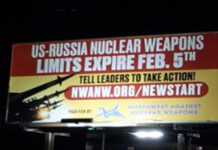


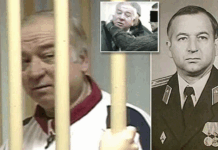
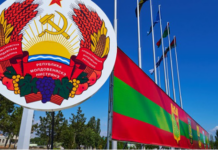





Understanding of internet and basic typing skill… It’s been an amazing experience working with them and i wanted to share this with you, because they are looking for new people to join their team now and i highly recommend to everyone to apply… Visit following page for more information… https://extrasavingshere1.blogspot.com/
[…] In a June 3 interview, President Putin said Ukraine “must clear the mines and raise the ships they sunk on purpose in the Black Sea to make it difficult to enter the ports to the south of Ukraine… we will not use the demining process to initiate an attack from the sea.” He added there are numerous ways grains from Ukraine could be exported by rail or by sea, with full Russian cooperation.[1] […]
[…] CovertAction Magazine 8 June 2022 […]
[…] Joe Biden’s Saber-Rattling Threatens World War III—with China and Russia, by Dee Knight […]
This is another excellent article on the growing crisis in Ukraine. The sheer evil of what Biden & co. have done here is absolutely stunning!. We now have a compounding food crisis triggered by the escalation of an increasingly dangerous war. And all of this was so very predictable. But at last, it seems that more and more people are rallying internationally for peace and positive negotiations. We must grow this momentum.